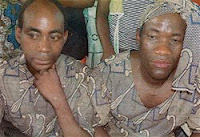 Jun 14 2012 (IPS) - At a news conference shortly after she was sworn in as Malawi’s president, Joyce Banda announced her government’s intention to decriminalise homosexuality. It is unclear how she will achieve this, but the move is in stark contrast to the approach of her predecessor, Bingu wa Mutharika, who openly condemned it.
Jun 14 2012 (IPS) - At a news conference shortly after she was sworn in as Malawi’s president, Joyce Banda announced her government’s intention to decriminalise homosexuality. It is unclear how she will achieve this, but the move is in stark contrast to the approach of her predecessor, Bingu wa Mutharika, who openly condemned it.In a region in which lesbian, gay, bisexual and transgender (LGBT) rights have often been rejected in the name of traditional values, Banda’s stance is bound to attract attention. Hopefully, it will bring about some rethinking of policies that discriminate against LGBT people and often even criminalise homosexual practices.
In fact, Banda has taken a series of brave stands since she took office. Her refusal last week to host the African Union summit in July because the AU insists on having President Omar al-Bashir of Sudan there, despite his outstanding arrest warrant from the International Criminal Court, is just one of them.
And amending LGBT rights is another indication of her determination to lead Malawi back onto the path of being a forward-looking democracy and a state that respects universal human rights and global bodies such as the ICC over and above parochial interests.
Banda, the former vice president, inherited a grim economic situation when she took office in April, the first woman to become a head of state in the southern African region. Soon after taking office, she announced that she intended to repeal repressive laws and policies, some of them passed under Mutharika’s rule, including the laws criminalising same-sex acts.
The repeal of these repressive laws would be good news for Malawi and for Africa. It would not only spare members of the LGBT community the fear of prosecution, but would also negate the legitimisation of violence, abuse, and discrimination based on sexual orientation.
It would also be the first time since 1994 that an African country has repealed anti-LGBT legislation, and would add renewed impetus to global efforts toward decriminalisation of same-sex conduct.
Read the rest.
-------------------
*Join IRMA's robust, highly-active. moderated, global listserv addressing rectal microbicide research and advocacy as well as other interesting new HIV prevention technologies by contacting us at rectalmicro@gmail.com. Joining our listserv automatically makes you a member of IRMA - a network of more than 1,100 advocates, scientists, policy makers and funders from all over the world.
*Please look for us on Facebook: www.facebook.com/InternationalRectalMicrobicideAdvocates, and you can follow us on Twitter: @rectalmicro.
*Also, please note that shared news items from other sources posted on this blog do not necessarily mean IRMA has taken any position on the article's content.
-------------------


















